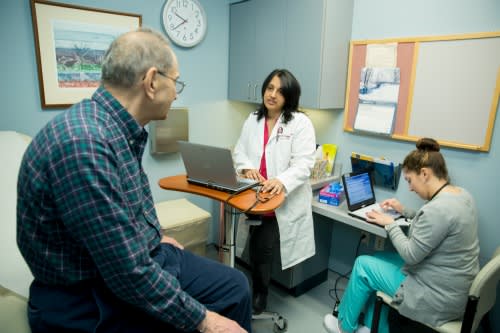By: Kristine Pantchenko, RN
What exactly is the difference between type 1 diabetes and type 2 diabetes? We often see type 1 diabetes occur in children and type 2 diabetes occur in adults. Does this suggest that type 1 diabetes will become type 2 diabetes? No, both are completely different forms of the disease. Nevertheless, both chronic conditions have a similar treatment goal -- to control high blood sugar. High blood sugar occurs in people diagnosed with both type 1 and type 2 diabetes. So, what causes type 1 and type 2 diabetes and what should we all know about how to best manage diabetes in either form of the disease.
“Diabetes is a problem with insulin. Your body may not make enough insulin, or may make none at all. And/or your cells may not respond the right way to insulin in the blood. Either way, this means that glucose has trouble entering the cells. If it can’t enter the cells, it builds up to a harmful level in the blood stream” (Krames Patient Education, 2013). This causes health complications. Signs and symptoms of high blood sugar include: increased thirst, increased appetite, increased urination, unexplained weight loss, dehydration, fatigue, sudden vision changes, tingling or numbness in the hands and feet, dry skin, recurrent infections, and slow wound healing. Complications of high blood sugar include: stroke, heart attack, eye disease, kidney problems, erectile dysfunction, nerve damage, and amputations.
Type 1 diabetes affects approximately “1 million Americans and accounts for 5-10% of all cases of diabetes. Although it can occur at any age, about half of patients newly diagnosed with DM1 are younger than 20 years old” (Strayer & Schub, 2013). According to Krames Patient Education (2013), when you have type 1 diabetes, the pancreas is not making any insulin at all. Insulin injections need to be taken every day to replace what the pancreas is not doing. Type 1 diabetes often develops during childhood; however, adults can also develop the disease. The treatment goal for diabetes type 1 is to control high blood sugar through monitoring, eating healthy, being active, insulin injections, and diabetes education.
Accounting for 90 – 95% of diabetes cases, Type 2 diabetes is the most common type of diabetes. “When you have type 2 diabetes, the pancreas may still be making insulin, but the cells may not respond to insulin the way they should. This is called insulin resistance” (Krames Patient Education, 2013, p. 5). Certain ethnic groups have a higher risk for developing type 2 diabetes: African American, Latino, Native American, Asian American, and Pacific Islander. Additionally, type 2 diabetes is more prevalent in older adults, but there has been an increase in children developing type 2 diabetes. Treatment of type 2 diabetes may or may not include insulin injections. There are various oral medications available to help control blood sugar in type 2 diabetes. Beside medications, treatment for type 2 diabetes is also focused on controlling high blood sugar through monitoring, being active, eating healthy, losing weight if necessary, and diabetes education.
For more information about diabetes, you can go to the American Diabetes Association website, at http://www.diabetes.org/diabetes-basics/.
References:
Krames Patient Education. (2013). Living Well with Diabetes. USA: Krames StayWell, LLC.
Strayer, D., & Schub, T. (2013, July 5). Diabetes Mellitus, Type 1. Retrieved from Nursing Reference Center
American Diabetes Association. (2014). Facts About Type 2. Retrieved from American Diabetes Association: http://www.diabetes.org/about-us/who-we-are/?loc=superfooter
Featured Expert/ Author















